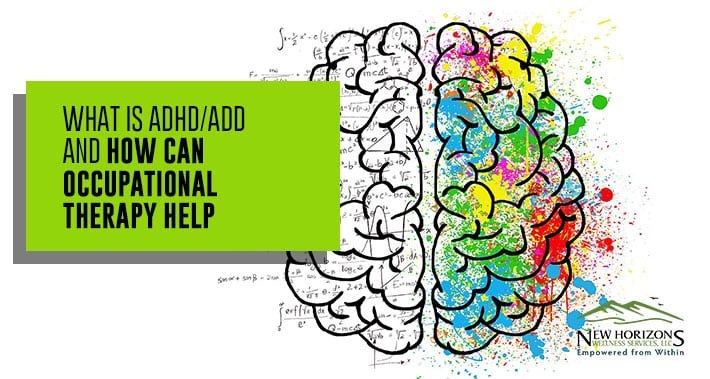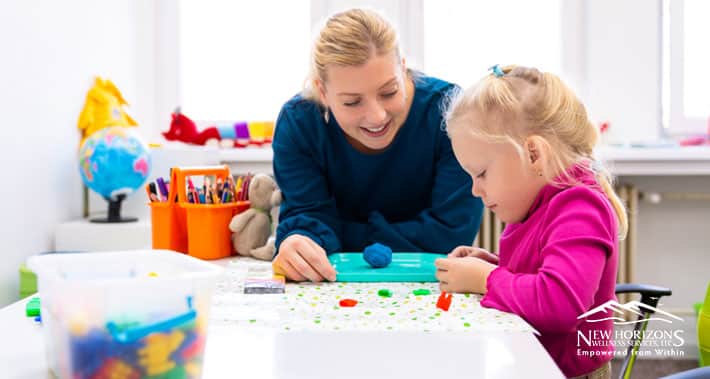
These days it doesn’t take much to hear someone joke that they may have ADD/ADHD.
With the near constant distraction of screens (phones, computers, tablets, etc.) and the constant bombardment of information, focusing on one thing can feel difficult if not impossible.
But even though ADD/ADHD has become a widely discussed topic, there is still a lot of misinformation out there.
Keep reading to find out more about what it really means to have ADD/ADHD.
We’ll also take a look at how occupational therapy for kids and occupational therapy for adults can help.
What is ADD/ADHD?
ADHD stands for attention deficit hyperactivity disorder and is a broad term for a neurodevelopmental disorder that can cause a variety of symptoms, namely above-normal levels of impulsive and hyperactive behaviors.
A person with ADHD has brain activity and development that’s different from a neurotypical person – that is, a person who does not have ADHD or any other neurological conditions.
ADHD can affect your ability to stay focused on tasks, maintain self control, and sit still.
It can affect both adults and children, but is more frequently diagnosed at a younger age.
According to research from the Centers For Disease Control, about 5% of American children have ADHD.
What Is The Difference Between ADD and ADHD?
ADHD is now the overarching term we use to apply to the conditions known separately as ADHD and ADD.
In the past, ADD was considered a type of ADHD that doesn’t involve the hyperactivity that people usually associate with the condition.
ADD stands for attention deficit disorder but is now considered an outdated term.
The term ADD was used to describe people who have difficulty paying attention but do not have issues with hyperactivity.
It’s now commonly known as inattentive ADHD.
What Causes ADD/ADHD?
Researchers have yet to figure out what exactly causes ADHD/ADD but given that it is a neurodevelopmental disorder, it is believed that ADHD is a neurological issue.
ADHD/ADD is most likely genetic, as researchers have found that it tends to run in families.
Other research suggests that people with ADHD may have different levels of dopamine than those without ADHD.
Dopamine is a neurotransmitter in the brain that moves signals from one nerve to another and helps to trigger emotional responses and movements in humans.
There may be other structural differences in the brain as some studies have suggested that people with ADHD have less gray matter volume.
Gray matter includes the parts of the brain that work with speech, decision making, self-control, and muscle control.
Another study found that prenatal exposure to alcohol and cigarettes made children more likely to develop ADHD.
ADHD may also be caused by exposure to certain chemicals and pesticides. One study found that organophosphates (pesticides commonly sprayed on lawns) could have adverse effects on children’s neurodevelopment.
As well, for reasons that aren’t yet clear, boys are more than twice as likely to have ADHD than girls.
While research is ongoing into each of these avenues, we have yet to pinpoint a single cause for ADHD.
What Are The Symptoms of ADD/ADHD In Children?
If you have a child who’s particularly rambunctious, you might wonder whether or not they have ADHD.
And while that is indeed one of the signs, there’s more to it than that.
Read on below to find out about the categories of symptoms of ADHD in children.
1.Hyperactivity/Impulsivity
Hyperactivity includes a range of behaviours including fidgeting, squirming, tapping, talking out of turn, and constant movement especially in situations where it’s not appropriate.
Impulsivity involves making decisions with little to no consideration of the consequences as well as regularly interrupting peers, teachers, and parents.
The list of signs that fall under this category include:
- Being unable to focus on one activity
- Having difficulty completing a task
- Being easily distracted or bored with tasks
- Having trouble listening
- Having trouble following instructions
- Having trouble processing information
- Having trouble sitting still
- Having trouble following a story being read to them
- Being constantly in motion
- Moving from toy to toy, or activity to activity
2. Inattentivity
Children with inattentive ADHD aren’t as disruptive or active as children who have hyperactive-impulsive ADHD.
An inattentive child is one who:
- doesn’t follow instructions
- is easily distracted and misses details
- is forgetful, even in everyday activities
- has trouble focusing on the task at hand
- has difficulty learning or organizing new information
- becomes confused easily and daydreams frequently
- becomes bored easily
- processes information more slowly and with more mistakes than peers
- has trouble completing homework or loses items needed to stay on task

What Are The Symptoms of ADD/ADHD In Adults?
Adults with ADHD don’t always display symptoms in the same way children do.
These are some of the most common symptoms of adults with ADHD:
- lack of focus
- hyper focus
- forgetfulness
- time management problems
- disorganization
- impulsivity
- poor self-image
- lack of motivation
- restlessness and anxiety
- fatigue
- emotional problems
- relationship issues
- substance misuse
- health problems
Interestingly, while most adults who were diagnosed with ADHD as children still show signs as adults, about 40% seem to grow out of them.
How Can Occupational Therapy Help With ADD/ADHD
Occupational therapy can help with ADD/ADHD by improving certain skills in children.
This includes such skills as:
- Organization
- Physical coordination
- Controlling energy levels
- Everyday tasks such as showering, making their bed, or organizing their backpack
An occupational therapist will work with your child to help them learn the skills they need to be confident and independent in life.
Your occupational therapist will usually start by looking at how ADHD is affecting your child’s home life, school life, and social life.
They may also engage the child in various activities to figure out what their strengths and weaknesses are.
Your child’s occupational therapist may also suggest starting with an evaluation to find out whether your child actually has ADD/ADHD, or another neurological condition.
Once your child has been assessed, their occupational therapist can help them by teaching them new techniques for everyday tasks. These include:
- Teeth brushing or getting dressed
- Techniques to improve focus
- Time management skills
- Activities to work out anger or aggression
- Practicing social skills
An occupational therapist may also test your child for sensory processing disorder, a disorder that affects how one processes sights, sounds, smells, and other senses.
For adults with ADD/ADHD, treatment is a little different.
Your occupational therapist will start by getting a better understanding of what your day to day responsibilities are, and where your ADD/ADHD is getting in the way.
Depending on your lifestyle, they may consider:
- Your professional career
- School
- Interpersonal relationships
- Family & social responsibilities
- Transitional periods of life (new career, moving from school to workforce, state custody to adulthood, etc)
Once your occupational therapist has a better understanding of what your life is like and what your needs are, you’ll work together to develop coping strategies to help you better meet the challenges of your daily life.
Contact New Horizons Wellness Services
Do you have trouble staying focused and completing everyday tasks?
Are you concerned that your inability to focus is a sign of a bigger problem?
If you’re concerned you or your child has ADD/ADHD, New Horizons Wellness Services can help.
Book an appointment with New Horizons Wellness Services to learn more about ADD/ADHD and see how we can help you to overcome the difficulties of this disorder and get your life back on track.
Call New Horizons Wellness Services and book your appointment today.
Yours in Health,
New Horizons Wellness Services13333 SW 68th Pkwy,
Tigard, OR 97223
- https://g.page/newhws
New Horizons Wellness Services provides a true multidisciplinary approach to mental & physical health treatments for children, adults and families.
